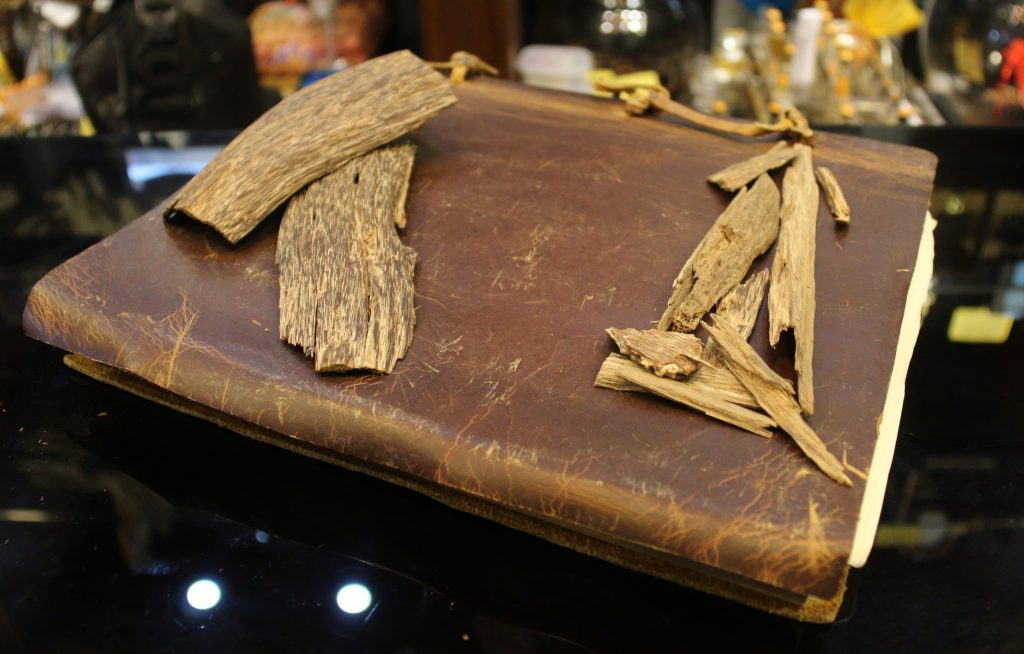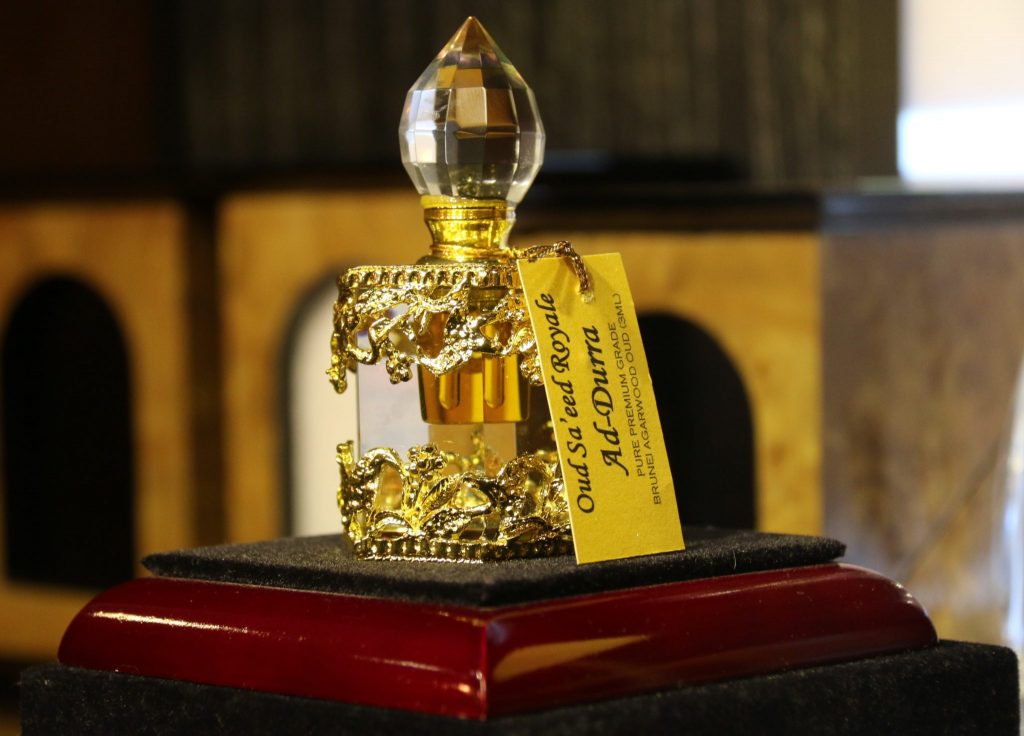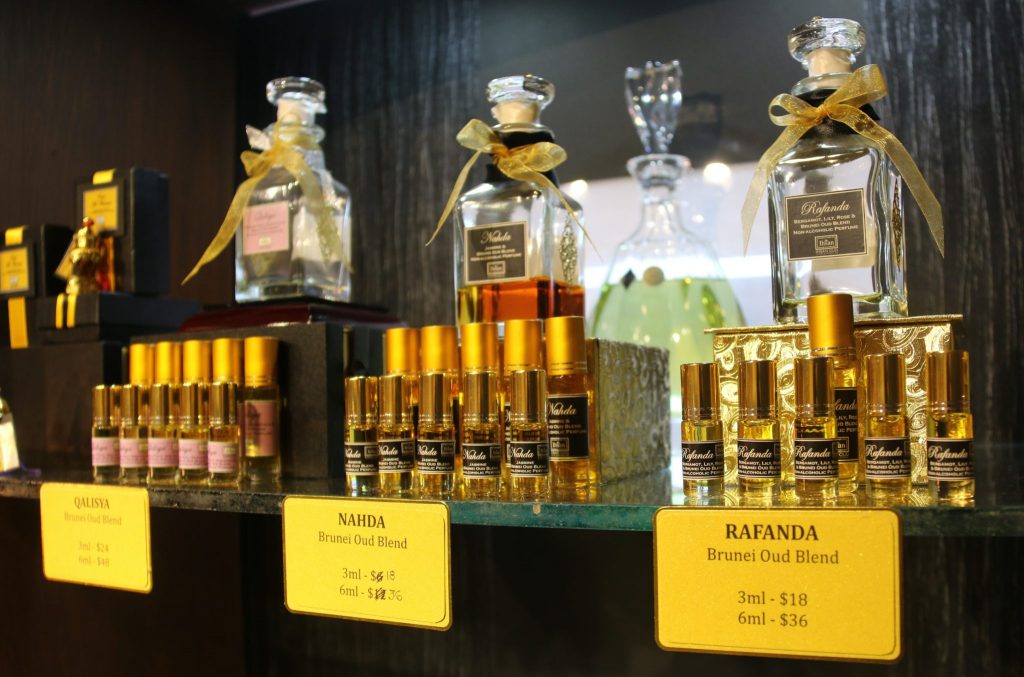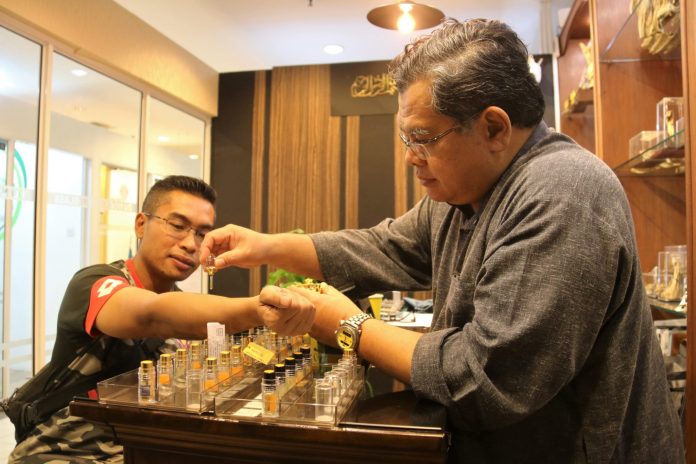On foot, in the dense jungles of Brunei’s south, was when a young infantry soldier learned of the value of gaharu first hand.
Mohd Sallehin Hj Mohd Taib (pictured R) was on routine duty, patrolling forest for illegal loggers who came in groups of six to ten across Brunei’s borders through mouse trails in search for ‘liquid gold’.
The bandits’ modus operandi: identify gaharu trees, fell them before sawing them into smaller chunks, while searching hurriedly for signs of resinous streaks.
“They were looking for agarwood,” says Sallehin. A dark fragrant resin that forms as part of the gaharu tree’s attempt to protect itself from an infection, agarwood is arguably the most expensive timber in the world; with the oil distilled from it – called oudh – commanding up to $100,000 for a single, undiluted litre of the highest grade.

Historical anecdotes of oudh border on the mystical; touting its power to heal ailments both mental and physical, while some cultures use it for embalming when preserving the dead.
Sallehin’s earliest memories of oudh came in perfume bottles brought by family and friends who visited the middle-east – where it is considered a cultural touchstone due to its rarity and scent.
“I became a big fan,” he said. “I would be so happy whenever a friend or relative gave them as a gift. I would collect the bottles, something i still do to this day.”
But for the young soldier with aspirations of becoming a pilot, becoming an artisinal distiller – was not on the list.
Fast forward three decades, and in the grand halls of the Empire Hotel & Country Club’s lobby, you’ll find Sallehin’s scent – the Oud Sa’eed Royale Ad-Durra – in an exclusive, high-end display as part of a first line of locally made products showcased under Darussalam Enterprise’s Made in Brunei initiative.

If there’s anything to be learned from the illegal loggers, or the insatiable demand for oudh abroad- it’s that Brunei’s has a valuable natural resource in gaharu. But can Brunei find a way to do it sustainably?
With land in Tanjong Maya, Tutong where his grandfather formerly resided, and the support of the village’s residents – Sallehin has found just enough supply of agarwood to get his business off the ground.
Ihsan Oud – named after Salehin’s first born, who he tragically lost just four days after birth – now adorns the signage of a small kiosk at Gadong Centrepoint’s arcade of shops on the first floor.
The retired Lieutenant Colonel greets his customers warmly as they enter; for those a little curious about the origins of oudh, Sallehin is keen to provide a introduction; and for the oudh enthusiasts – he’ll get into the painstakingly detailed process of distillation which he traversed to Cambodia, Thailand and Indonesia to learn.
“We’re starting to see a trend of more and more gaharu plantations abroad,” said Sallehin. ” Aquilaria Malaccensis (gaharu) itself is unique to this region and you’re seeing large corporations taking it on.”
In Brunei – the word on whether one can seek for government land to plant agarwood remains unclear, according to local oudh sellers, who can only recall a directive, several years ago, that prohibited such applications.
The problem can be traced back to the rarity of tree – considered in some parts to be endangered – and made worse by indiscriminate and illegal logging.
And then there’s the finding that it’s only a percentage of gaharu trees in the wild – some experts estimate as low as 10 per cent – that actually bear the dark resin known as agarwood.
Learning from best practices from sustinable gaharu plantations, Sallehin employs a different approach on his grandfather’s privately owned land.
He bores a hole into the tree, inserts a tube that’s attached to a litre sized bottle which slowly releases a bacterial mold that seeps into the tree – resulting in the formation of the agarwood as the tree works to protect itself, a process known as inoculation.
“Depending on how tall the tree is, sometimes we put up to 50 (bottles),” he said.
The process however, is far from overnight. A gaharu tree that’s planted, takes about five years before it can be inoculated, a processs that will take another one to two years.
Instead of felling the tree once it’s ready, Sallehin shaves off the barks, which can repeated for up to five years, before the tree will be chopped down.
An average-sized gaharu tree that’s been thoroughly inoculated can yield about 100 kilogrammes of agarwood – and you’ll need 500kg to distill a litre of pure oudh oil.
At Ihsan Oud -Sallehin now sells more than 10 varieties of oudh blends, experimenting with mixtures from sandalwood to rose. He sells them as handy, potent roll-ons, in small three and six milliliter vials – priced between $6 to $48 – as opposed to bottled perfume sprays.
At the recent Made in Brunei Market Fair – Ihsan’s first major public event – they sold more than 300 vials, but Sallehin’s ultimate ambitions actually lie in being a premier supplier of pure oudh oil.
“We see oudh taking off in West now, with all the big name brands having an oudh line,” he said. “And I believe and am willing to prove that we have amongst the best pure oudh oil in the world. So why should we not be supplying to them?”

Ihsan Oud is located at T1-06 of the Terminal One shops at the Centrepoint Hotel in Gadong, and is open everyday from 10am to 9.30pm, except for Fridays where doors open at 2.30pm. Follow @ihsan_oud on Instagram to learn more. You can contact Ihsan Oud directly at +6737162356.












